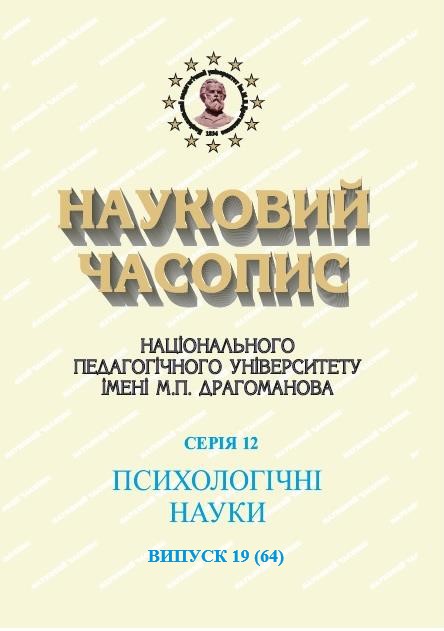STUDYING VALUE AND SEMANTIC CORRELATES OF PERSONALITY INDEPENDENCE IN ADOLESCENT AGE
DOI:
https://doi.org/10.31392/NPU-nc.series12.2022.19(64).01Abstract
Objective. The article is dedicated to studying value-semantic correlates of personality independence in youth. Research methods: the author’s method “Judgment of Independence” is applied. With the help of this technique and based on the results of the content analysis of the answers of the researched, important characteristics of independence/non-independence of the personality of youth age were determined. Identified semantic units equivalent to the concepts of “independence” and “non-independence” of personality in youthful age. The procedure for carrying out the task was to obtain from the participants under research an unlimited number of definitions describing the concept of “independence/non-independence” of an individual. Results. Several signs characteristic of an independent and non-independent personality have been defined. The peculiarities of the value-semantic sphere of the personality, i.e. its dynamic and functional system, which forms meanings, life goals and regulates ways of achieving them, are revealed. Conclusions. It has been established that the value-semantic structure of individual independence in youth consists of such semantic categories as: (1) responsibility, (2) skill/ability to make decisions on your own, (3) independence, (4) skill/ability to solve problems, (5) ability to provide for oneself, (6) ability to perform actions oneself, (7) self-realization, (8) freedom of choice, (9) self-control, (10) self-confidence, (11) purposefulness, (12) the ability to admit and correct mistakes, (13) maturity, (14) the ability to assess the situation, (15) calmness. In contrast to this, the value-semantic structure of the individual’s lack of independence in youth combines such content categories as: (1) dependence, (2) helplessness, (3) inability to make decisions on your own, (4) inability to act, on your own (5) insecurity, (6) irresponsibility, (7) inability to take care of oneself, provide for oneself, (8) insufficient self-control or external control, (9) lack of initiative, indifference, (10) infantilism, (11) inability to make a choice, (12) uncritical perception of others.
References
- Voloshyna, V. (2015). Psykholohichni tekhnolohii pidhotovky maibutnikh psykholohiv [Psychological technologies of training future psychologists]. Vinnytsia : TOV «Nilan-LTD» [in Ukrainian].
- Dolynska, L.V., & Penkova, O.I. (2016). Samorealizatsiia osobystosti yak sotsialno-psykholohichnyi fenomen [Self-realization of the individual as a socio-psychological phenomenon]. Naukovyi chasopys Natsionalnoho pedahohichnoho universytetu imeni
P. Drahomanova. Seriia 12. Psykholohichni nauky – Scientific Journal of National Pedagogical Dragomanov University. Series 12. Psychological Sciences, 3(48), 18–25 [in Ukrainian]. - Pavliuk, M. (2018). Teoriia i praktyka rozvytku samostiinosti maibutnoho fakhivtsia [Theory and practice of developing the self-dependence of the future specialist]. Zhytomyr : Vyd-vo ZhDU im. I. Franka [in Ukrainian].
- Tytarenko, T.M. (Ed.). (2005). Osobystisnyi vybir: psykholohiia vidchaiu ta nadii [Personal Choice: The Psychology of Despair and Hope]. Kyiv : Milenium [in Ukrainian].
- Shyroka, A. (2019). Sproba intehratsii kontseptsii separatsii-indyviduatsii u vitchyznianu psykholohiiu [An attempt to integrate the concept of separation-individuation into domestic psychology]. Problemy suchasnoi psykholohii – Problems of modern psychology, 21, 770–781. Retrieved from http://journals.uran.ua/index.php/2227-6246/article/view/159691 [in Ukrainian].

